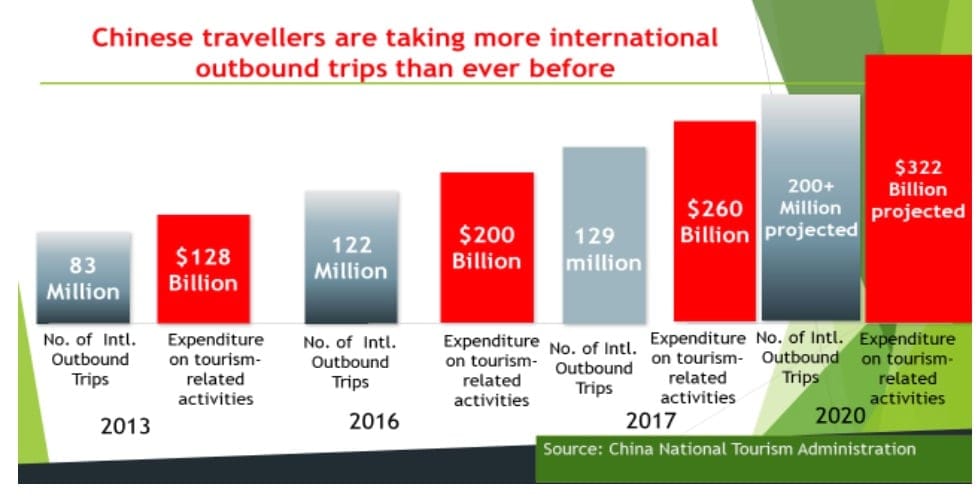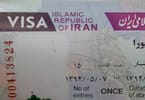The People’s Republic of China travellers, according to the United Nations World Tourism Organisation (UNWTO), are the world’s top tourism spenders, accounted for almost $260 billion in 2017 alone. This is coupled with phenomenal growth in Chinese outbound tourism globally.
A growing part of that spend is now happening in Africa, reinvigorated by relaxed visa rules, increased interest in the continent’s cultural and historical sites, and initiatives that seek to appeal to Chinese tourists. Countries in Southern Africa, have had a significant increase in Chinese tourists and this is coupled with new visa regimes. For example, Zimbabwe upgraded visa category for Chinese tourist from Category C (Visa before travel) to Category B (Visa on arrival) for Chinese tourists. African destinations, therefore, stand to benefit from better jobs to be created with booming Chinese outbound tourism, and an open policy toward developing better cultural exchanges is important in this respect if Africa is to tap from the Chinese travellers who are now sought after by many regions around the world. It is projected that the People’s Republic of China outbound tourism will continue to surge ahead of other source markets and is predicted to reach the 200+ mark by 2020, projected to account for close to 322 billion in cumulative expenditure.
Indeed, with China’s booming economy, its middle class growing and expected to reach about 400 million by 2020. The number of yuan billionaires on the Chinese mainland could reach 110,000 by 2020, according to a report published by the Hurun Research Institute. These development buoyed by rapid economic growth would mean an increase in Chinese business people and high spenders affording long stay travel and high spending in destinations. Essentially, outbound travel from China is predicted to reach 154 million trips globally at the end of 2018 – which will be 6.3% increase from 2017 according to the China Outbound Tourism Research Institute (COTRI) Report. Impressively, an average of 2.8% of these travellers, is reported that they will be making their way to Africa and this would see 4.31million tourists bringing air travel, accommodation, ground transport, retail, the food industry and other travel value chains in the benefit stream much to the benefit of African economies.
While Asia, Europe and the Americas still take the largest share of Chinese outbound tourism, Africa has recently become an attractive destination as well, and the number of visits to the continent from China reflects this new trend. The levels of confidence in the African market is growing and this is supported also by cordial socio-economic and political cooperation that is enjoyed between China and Africa. Currently, Morocco, South Africa, Madagascar and Namibia are now considered top destinations in the continent for Chinese tourists. It is also expected with more support towards Zimbabwe’s Ministry of Environment, Tourism and Hospitality Industry and treasury being generous for its budgetary support towards the Zimbabwe Tourism Authority, the country stands to also grow its Chinese tourist numbers and benefit from that growing market. There is no doubt that Zimbabwe, like other African destinations, remains fundamentally important and attractive to the Chinese outbound tourism.
Notably, the greater interest in Africa among Chinese tourists is partly due to a shift in strategy by African nations, along with support from Chinese political leadership and policymakers. African countries have developed national strategies targeting Chinese tourists’ spending power, as well as Chinese capital, tourism know-how and logistical strength. Showing its awareness of the importance of Chinese tourism, many African countries such as Morocco decided to grant visa waiver for the Chinese visitors in 2016, and as mentioned earlier on, Zimbabwe and many others, have upgraded the People’s Republic of China visitors from Visa Category C (Visa before travel) to Category B (Visa on arrival). The move consequently, results in high arrivals from China and spending which benefits African economies.
The other important development identified by China Outbound Tourism Research Institute (COTRI) is the fact that Chinese tourists seek five things in a travel destination: the beauty and uniqueness of the continent rated (56%), safety (47%), ease of group visa procedures (45%), friendliness of locals to tourists (35%) and affordability (34%). This is particularly relevant for Zimbabwe and other African markets and these explain how the tourism industry would need to organize itself and tap optimally from the Chinese market. It also highlighted that easier visas in North and East Africa, coupled with improved tailor-made product offerings are driving the growth of Chinese tourist arrivals in those regions. In Southern Africa, Namibia is performing incredibly while Kenya and Tanzania were named as the ‘hottest up-and-coming African destinations for the China market’ by COTRI.
As spending by the China market increases globally, high-net-worth individuals are said to be leaning toward adventure travel, exciting locations with pristine flora and fauna and – very promisingly, for the African continent – there is growing keenness to explore less-well-known African destinations. The trend in terms of spending generally represent free capital transfer, and if the continent leverages this form of affirmative and voluntary support by the Chinese market, there are huge opportunities for tourism to transform Africa in terms of GDP contribution and employment creation to contain the demographically young population. Many are lost as they try to cross the Mediterranean Sea to Europe where many seek jobs in the tourism and hospitality industry. Africa’s Agenda 2063 highlights the importance of tourism development and this can be part of the solution to curb out migration of the continent’s key population and keep them inside the continent for development. Thus, there is logic in harnessing the Chinese market and take advantage of it to develop tourism in Africa. Additionally, favourable investments and product development policies should be enacted, land also availed to put up infrastructure that captures the Chinese market. This will ensure that the environment and product taste conform to this market. Fortunately, at the political-administration levels, there is growing cooperation and goodwill, hence the private sector between Africa and China must follow suit and support high-level cooperation for the development of tourism and consequently, the two communities.
WHAT TO TAKE AWAY FROM THIS ARTICLE:
- Showing its awareness of the importance of Chinese tourism, many African countries such as Morocco decided to grant visa waiver for the Chinese visitors in 2016, and as mentioned earlier on, Zimbabwe and many others, have upgraded the People's Republic of China visitors from Visa Category C (Visa before travel) to Category B (Visa on arrival).
- African destinations, therefore, stand to benefit from better jobs to be created with booming Chinese outbound tourism, and an open policy toward developing better cultural exchanges is important in this respect if Africa is to tap from the Chinese travellers who are now sought after by many regions around the world.
- It is projected that the People's Republic of China outbound tourism will continue to surge ahead of other source markets and is predicted to reach the 200+ mark by 2020, projected to account for close to 322 billion in cumulative expenditure.























